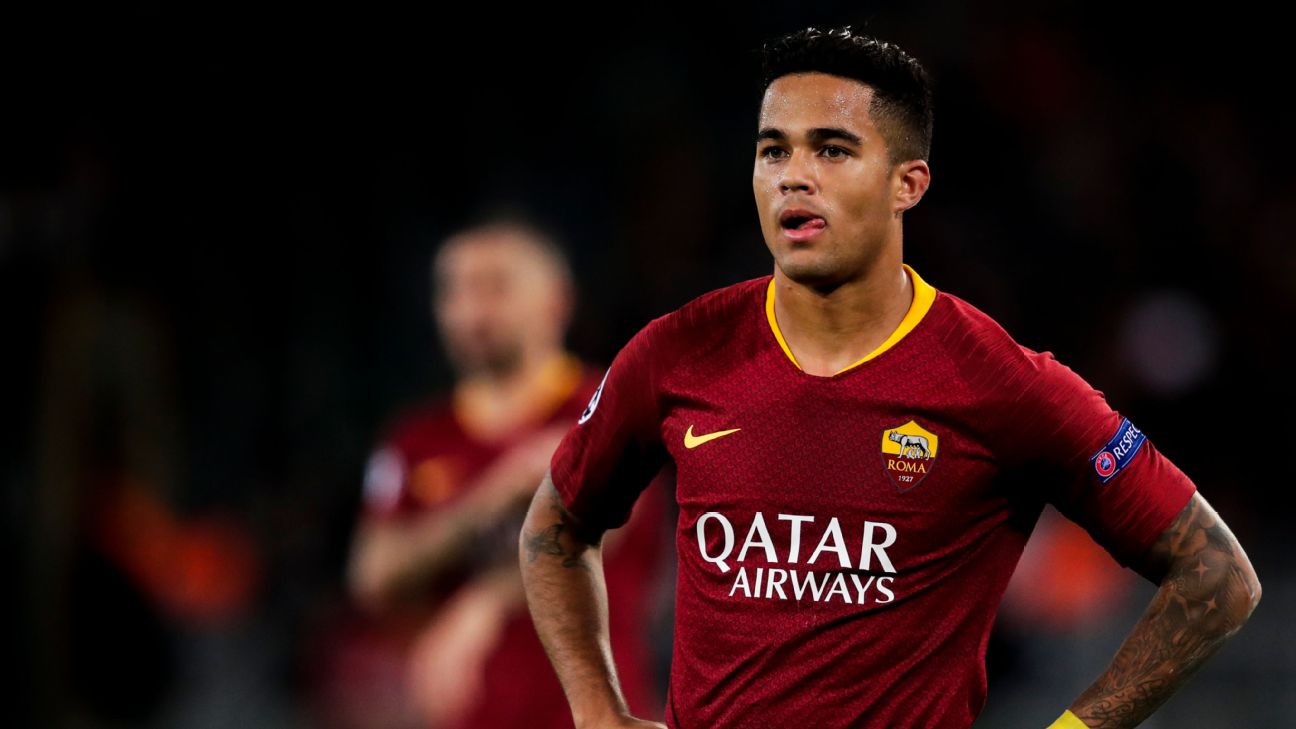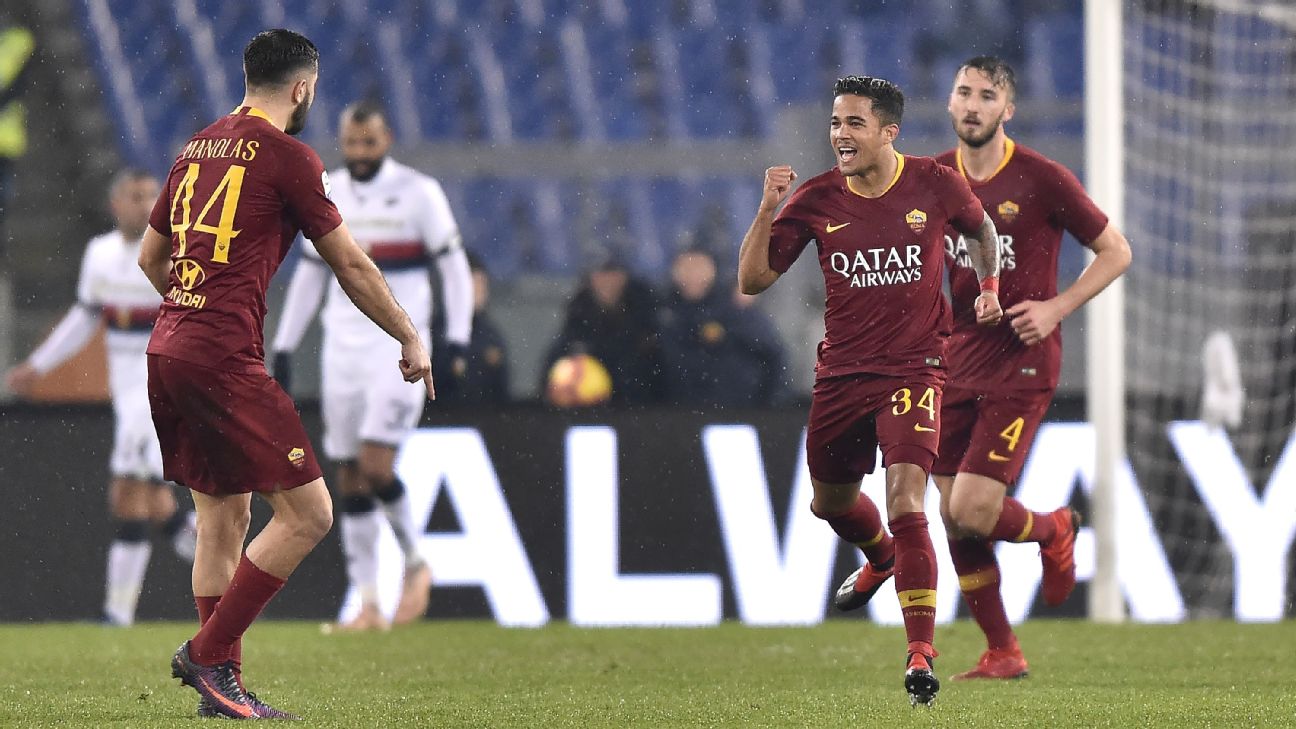

ROME — The mischievous cats of Trigoria are playing in the afternoon sun, rolling around on their backs and toying with a piece of string dangling from a parasol. It’s a balmy day at Roma’s training ground, closer to summer than winter in temperature. The ashtrays on the patio are graveyards of cigarette stubs and plastic cups, the crema from strong coffee staining the sides.
Kicking either habit couldn’t have been easy this season. Roma are in the knockout stages of the Champions League again. They celebrated victory in the derby in September, and a top-four finish is within reach. The sudden emergence of Nicolo Zaniolo has everybody excited, but so far, it’s been a frustrating campaign for all those involved at the club.
Expectations were raised after last season. Usually you see the best from a coach in their second year, and Eusebio Di Francesco had certainly generated a sense of gathering momentum during his debut campaign in the capital. As the sun starts to go down, he stands in the thick of the action; as the first team play a short-sided game, he’s shouting words of encouragement and making corrections. It’s here where Di Francesco hopes to effect a change of mentality. He does not want to see a repeat of the 7-1 defeat to Fiorentina in the cup, or a repeat of the losses to relegation-battlers like Bologna and SPAL. Nor does he again want to experience the irritation felt from opportunities missed against Chievo, Napoli, Cagliari and Atalanta.
Whenever Roma have looked poised to take off and leave their troubles behind, this talented team has hit the skids. Yet last weekend’s performance against Milan — a 1-1 draw in which Roma sparkled despite the boos that accompanied the announcement of the starting XI and a walk-out by the ultras after 15 minutes — has lifted spirits.
Such hostile environments can’t be easy to play in. Not everyone is Aleksandar Kolarov, the Serbian full-back who is defiantly standing up to the flak he has been copping from sections of Roma’s hardcore support in recent weeks. All this must be quite eye-opening for a new kid on the block.
Justin Kluivert doesn’t turn 20 until May and yet it feels like he’s been on the scene for ages. Put it down to a number of factors: the projection that all footballers with famous fathers experience; the huge hype surrounding every promising youngster who breaks into the first team at Ajax; and the curiosity surrounding what was said when Jose Mourinho pulled him to one side for a chat after the Europa League final in Stockholm two seasons ago.
At Kluivert’s unveiling back in June 2018, Roma’s sporting director Monchi picked up his phone and said: “Today I am receiving a lot of compliments. Not just for the sale [of Alisson, a then-world record for a goalkeeper], which I don’t like doing but believe was the right thing to do, but also for the team we are building.” He reminded journalists of the scepticism about Roma’s ability to beat the competition to Kluivert’s signature, with Kluivert being “a player everybody wanted.”
So far, we’ve only seen flickers of what the flying Dutchman can do in a Roma shirt. Kluivert came off the bench to set up Edin Dzeko‘s Marco van Basten-esque winner against Torino on the opening day of the season. And there have been other moments, like his first league goal, when he turned on the afterburners and left a couple of Genoa defenders for dead, that have really captured the imagination. But, as with Cengiz Ünder, who suddenly ignited at this time last year, we’re still waiting for Kluivert to catch fire, which is understandable for a kid coming to a new club in a different country with a new language and playing style to learn.
“The level is higher here,” Kluivert says. “That’s also why I chose to come here. The level is higher. I expect more of myself now. I want to be better every day. It doesn’t matter how old you are.
“I think when you’re ready for the next step, you have to go for it. And I felt that I was ready for the next step.”
 Kluivert is loving life in Italy: ‘The food is wonderful here. The pastas that they make here, I don’t know what all the names are but it tastes so good.’
Kluivert is loving life in Italy: ‘The food is wonderful here. The pastas that they make here, I don’t know what all the names are but it tastes so good.’
Watching Kluivert train, you notice a couple of things. One is the alert level of “twitchiness” with which he plays when his team has the ball; he waits for the signal to accelerate like the wind. The other is the attention he gives to tracking back and getting after his man when the opposition have the ball on his flank. This defensive effort, in addition to goals, is what Di Francesco wants and needs to see from him. Kluivert believes it’s this aspect in particular that represents the biggest difference in approach since he swapped the Eredivisie for Serie A.
“They really defend with each other [here],” he says. “That is the one thing that is really different here.”
Playing on the wing for Ajax and Roma is also “way different,” Kluivert explains. In Holland, it was a case of “stay on the outside and get the ball and go one against one. Here it’s more you go inside, outside, attack the space, and I think that makes me overall a better player. I learned a lot for the future. Hopefully one day I can play everywhere [in attack].”
As in the past with another Roma winger, Mohamed Salah, one of the parts of Kluivert’s game Roma appreciated most when they signed him was his speed; he has a breakneck pace that’s perfect for Di Francesco’s vertical style. Yet Kluivert comes across modest when asked if he is the quickest player at the club.
“I heard Kostas [Manolas] is the fastest,” Kluivert says. “He’s very, very fast.”
The Greek defender and hero of the Romantada is also one of the personalities to have made the biggest impression on Kluivert: “The craziest guy [in the dressing room] for sure that’s Kostas. He’s like … how do you say … a boss. He always makes jokes and everything. He’s a good guy.”
Roma’s captain Daniele De Rossi, whose leadership and on-field coaching have been greatly missed during a three-month injury lay-off, has also done his best to make Kluivert feel at home. “De Rossi speaks very good English,” Kluivert says. “He helped me through everything when I came here. The first days he helped me a lot. That’s a very good feeling when somebody like him gives you that respect, that he looks out for you. That’s perfect.”
Roma have an in-house interpreter on hand and Kluivert is busy studying Italian in his spare time. The best word in his vocab book comes as little surprise — it’s mangiare, “to eat.”
“The food is wonderful here,” Kluivert says. “My favourite plate … I have a lot actually. The pastas that they make here. I’ve never seen them. I don’t know what all the names are but it tastes so good. Risotto is here. Risotto asparagus or something. I love that also with a little bit of chicken for sure. Always chicken. Very, very nice.”
There is no ego to Kluivert. He’s instantly likeable and unguarded. There’s nothing flash about him other than his speed. Upon driving into Trigoria, one of those new Lamborghini 4x4s pulled out. But, as with full-back Alessandro Florenzi, who joked “I brought the big car to work today” while jumping into his Hyundai city car, Kluivert takes delight in the sensible choice he made.
“I bought a little Fiat,” he smiles. “And it’s the best car here. An awesome car. You can drive everywhere. You can park everywhere. I love that car.”
Driving in Rome, though, is not for the faint of heart.
“The roads here are crazy,” he laughs. “Everywhere there are bumps and holes. If you don’t watch out, you will lose your wheel for sure. But that keeps you sharp. Also on the pitch. You have to always be sharp here. On the road. On the pitch. Everybody drives fast in front of you so you have to watch out. But it keeps you focused.”
 Kluivert is making steady progress in his first season with Roma, notching one goal and three assists in 18 Serie A appearances.
Kluivert is making steady progress in his first season with Roma, notching one goal and three assists in 18 Serie A appearances.
As the Champions League comes around again, with Porto flying into Rome on Tuesday for the first leg of their last-16 tie, Kluivert evidently wants to keep making a mark.
In October, his strike against Viktoria Plzen made him Roma’s youngest-ever Champions League goalscorer, yet another reminder of how young he is. The names of his former Ajax teammates Matthijs de Ligt and Frenkie de Jong are fresher than Kluivert’s at the moment, but it’s worth pointing out that the former is the same age as JK and the latter is 21. The rise of the trio means there is a lot for Dutch football to be optimistic about.
“I think it’s growing,” Kluivert says. “It wasn’t so good for a while because the good players from back in the day stopped [coming through] and then [the next generation] were developing. Now you see the young boys are coming up. They’re getting older, 21 years old like Frenkie and Mathijs, 18, 19, [PSV’s Stefan] Bergwijn, if I can add myself.
“Those guys are coming up, we’re getting older and we’re getting better, and you see the Dutch team is now coming back … I think we can come very far for sure.” He’s clearly pleased to see de Jong moving to Barcelona at the end of the season. “Unbelievable,” Kluivert grins. “It’s a dream transfer. He loves playing football, he only wants to play football and that’s what Barca is.”
Too young to remember his father’s time at the Camp Nou, Kluivert still gets a kick out of remembering the guys his old man used to play with. His amber-coloured eyes light up as he mentions: “Rivaldo.”
The spitting image of his dad — “those are sterke genen, strong genes” — I show him a clip of his father being interviewed after scoring the winner for Ajax, aged just 18, against AC Milan in the 1995 Champions League final. Obviously too young to remember it — Kluivert was still only 10 when his father retired — he’s proud as he watches the footage.
“That’s something that, I think, not a lot of people [have done that so young], so that’s a very special moment in his life,” Kluivert says.
Naturally, the younger Kluivert wants to create his own special moments. And Roma hope his first Champions League strike against Plzen is just the beginning. “I am looking forward to scoring a lot more goals,” he says.

Be the first to comment